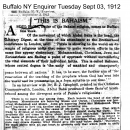Main menu
- ‘Abdu’l-Bahá’s Journey
- World Peace
- Stopping Racism in America
- Empowerment of Women
- More Principles...
- Prayer for America
This is Bahá’ísm
‘Abdu’l-Bahá, leader of the Bahá’í religion, comes to Buffalo this week.
Of the movement of which ‘Abdu’l-Bahá is the head, the Literary Digest, at the time of his attendance at the Brotherhood conference in London, said: “Persia is showing to the world an example of religious unity that seems to make western efforts in the same line appear elementary. Mohammedans, Christians, Jews and Zoroastrians are finding a point of approach without surrendering the vital elements of their individual faiths. This is called Bahá’ísm, whose central dogma is ‘the unity of mankind and consequently peace between all nations.’ It has, to be sure, the further aim of ‘the renovation of the teaching of the prophets whom God has sent into the world and its presentation in a form suitable to our time.’”
In an interview with Dr. R.J. Campbell, printed in the Christian Commonwealth, London, ‘Abdu’l-Bahá presented these facts of brotherhood among the divergent sects of Persia’s religionists:
There is no more war among them. Each honors the head of the other religions. Mussulmans are honoring Moses and Christ. Christians are honoring Mohammed and Moses. Jews are honoring Jesus and Mohammed. They have learned to love one another and are becoming one.
The cause of unity is the cause of life itself. It is divine. That which leads to division or hatred is satanic. Religion should make for unity. The prophets did not come to bring about distrust and separation. Ignorance is the cause of division and hatred. Religion is like medicine. It is meant to cure, but in the hands of unskilled or bad physicians what should effect a cure may create disease, what should give life may cause death. Therefore, we must strive with all our heart to promote only that which leads to unity and life.
It is not surprising, remarks Dr. Morgan, that people in increasing numbers “are attracted to the Bahá’í faith by its catholicity, the loftiness of its ethics, the simplicity of its teachings, its complete freedom from narrow and exclusive dogma.” He adds: “It has no organization, no hierarchy, no ritual, no fixed places of worship and times of meeting; in short, it is spirit and life. It does not seek to proselytize. You can be a Bahá’í without ceasing to be a Christian, a Jew or a Mohammedan.”









